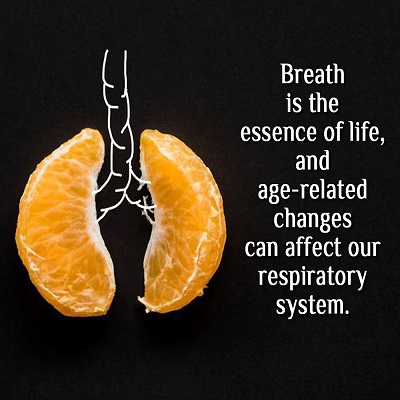Seniors’ Health Concerns
 There are quite a few age-related changes that happen in the respiratory system. A few of these changes include a reduced lung capacity, so oxygen intake decreases, how quickly a person can exhale decreases, the respiratory muscles weaken, and the overall lung defense mechanisms decline.
There are quite a few age-related changes that happen in the respiratory system. A few of these changes include a reduced lung capacity, so oxygen intake decreases, how quickly a person can exhale decreases, the respiratory muscles weaken, and the overall lung defense mechanisms decline.
The respiratory system is designed to work endlessly to supply the body with oxygen and dispose of carbon dioxide through breathing. The lungs and other organs and other tissues make up the respiratory system to sustain life through a very crucial function; to breathe. Breath is the essence of life and the main function of the respiratory system. In many elderly people, much of this system’s main functionality gradually declines.
Due to this decline, respiratory problems and diseases can develop, such as pneumonia. This poses a higher health risk. Continue reading
 Type 2 diabetes is a condition where levels of blood glucose in the body are too high. Many seniors have friends that are already diagnosed with type 2 diabetes, so they may worry that they could be someone who is diagnosed next!
Type 2 diabetes is a condition where levels of blood glucose in the body are too high. Many seniors have friends that are already diagnosed with type 2 diabetes, so they may worry that they could be someone who is diagnosed next!
It is a serious condition that can happen to anyone of any age, but people aged 65 years and above remain to have the highest prevalence of diabetes compared to any other age group. A senior is more at risk of getting type 2 diabetes if they lead a sedentary lifestyle, have a family history of diabetes, eat an unhealthy diet, or are overweight.
How Does Type 2 Diabetes Start?
Our body turns most of the food we eat into glucose. Glucose is what gives our body energy to function optimally. To turn glucose into energy, a hormone known as insulin, made by the pancreas, is also needed. Continue reading






